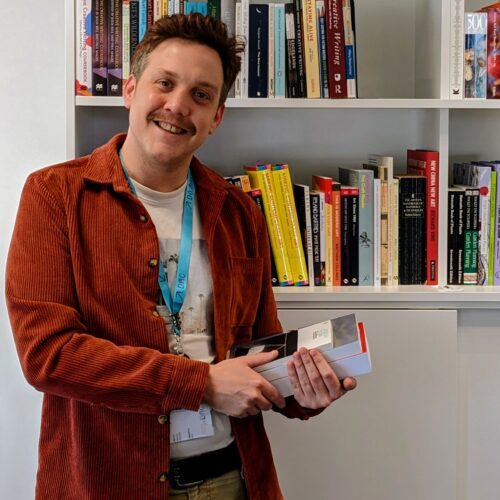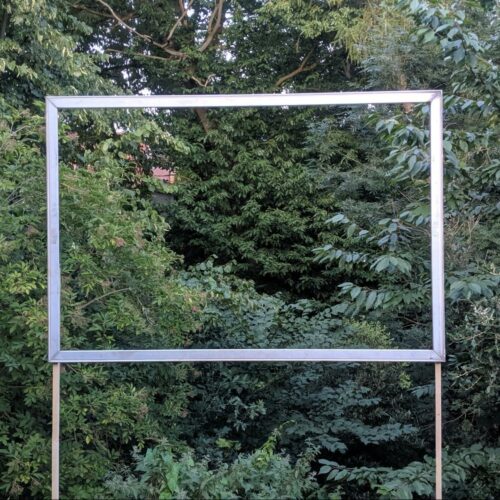
Preparing for assessment | Assessment for learning
As part of the changes OCA is making to respond to the Covid-19 pandemic, the summer assessment events are moving to digital only submission. We caught up with Christian Lloyd, Director of Learning and Teaching, and Moira Lovell, Director of Curriculum and Quality, about the changes and adopting the new Assessment for Learning Approach.
Hi Christian and Moira, with the UK in lockdown due to Covid-19 how has this affected assessment of student work?
Moira: With lockdown, we cannot assess work as we normally would. Ordinarily during our 5-6 week assessment events, we’d bring on site as many as 50 tutors to look at work which is just not possible in the current circumstances.
Christian: That’s right. OCA is in a much better place to react to this issue than a lot of the Higher Education sector, but we’ve still had to rethink the physicality of the work students submit, and how tutors assess work from home.
So how will students be assessed this summer?
Christian: The process will be digital only. This is to ensure the safety of students, tutors, and others involved in assessment, so nobody needs to go to the post office or deal with deliveries. We are going to use GDrive folders to submit the work, which students have used previously.
We are aware that we’ve had to introduce digital assessment rapidly. For some students, who have spent their whole course working with physical materials, this poses a bigger challenge than for those who have worked digitally from the start. To help deal with this we are asking for a selection of work, to make the task of digitally documenting work easier, and the assessment process more focused.
Moira: Where possible, your tutor will act as the central assessor for your work. I’m a tutor, and I have a familiarity with the work photography students produce. This relationship will hopefully mean students can feel less anxious about showing everything to the assessors.
Christian: Most courses ask students for an evaluation as part of the assessment process. We have extended this to include short presentations, such as slideshows, or even videos. This reflective evaluation or presentation should provide more room for students to talk about their learning journey as a whole. As an assessor myself, I’ve always wanted to hear the student, alongside seeing the work. I’d love to have the student talk me through their experiences and what they’ve learned. It could make the process much richer for assessors, and hopefully for students too. All students have the technology freely available to do this, such as Slides in the Gsuite, or using a mobile phone for video.
Moira: It’s also worth saying that all work at HE6 and HE7 will be double marked, plus a selection at HE4 and HE5.
How are we assuring quality in this new process?
Moira: These decisions have been informed by guidance from the Office for Students, which gives confidence to act flexibly in the interests of our students, and to ensure that students are not unduly penalised for the impact of Covid-19.
We have been mindful to keep the basic principles of assessment the same, it’s just the location of assessors and external examiners that is changing.
Christian: Yes, ensuring that the assessment process is rigorous and fair is very important. Assessment will still take place within a team, led by a Programme Leader but how the team communicates is going to change. Basically more zoom meetings!
How will students find out about digital assessment?
Christian: We’ve developed a Preparing for digital assessment document to cover each subject area. This provides structured guidance and support for the assessment process and how to submit.
Moira: It also has more detail about what changes we’re making, why, and how students can understand and learn from assessment. It’s important to read this through carefully and apply this guidance to your summer assessment submission for your best possible outcome.
What are the benefits of running digital assessments?
Christian: We’ve been discussing for some time the role of assessment and how it integrates with all of the other activities and learning that students do. The approach we’ve come up with focusing on assessment for learning, rather than assessment of learning. This means assessment is much more student-focused and reflective, which hopefully makes it more useful for students.
Moira: Absolutely, we’ve been exploring this since 2018 in consultation with students. The new Assessment for Learning approach is intended to give assessment itself more meaning beyond just receiving a mark for your work.
Christian: On a practical level, I think we’ve made the process much more streamlined. We’re asking students to be more reflective and selective in what they submit. There is an important sustainability perspective to this too, in reducing the amount of paper we use, and travel, thereby reducing carbon emissions. Ultimately though, a blend of physical and digital assessment practices encourage the development of a wider range of skills in our students.
How will students get their feedback?
Moira: Given the circumstances, this assessment event is going to take longer than normal. Students will still receive feedback and grades.
Christian: With tutors more involved in the process, we are hoping that much of this summative feedback can be delivered through video conferencing and reports, or with more opportunities for students to ask questions to help understand their feedback.
How do you see assessment working post-lockdown? Will these changes to assessment stay?
Moira: We’ve been planning to introduce some of these approaches to assessment for some time, we’ve brought everything forward due to the coronavirus outbreak so we can best support our student body. Moving forward, we are looking to implement a holistic assessment model that balances both physical and digital approaches. In preparing for assessment we want to ensure students develop and test a range of invaluable skills. We are looking to provide a model that leads to better outcomes for students.
Christian: I’d agree, we have to recognise this is a special, one-off event and the changes we are making are to ensure no student is negatively impacted by the pandemic. But the changes we are making, the assessment for learning approach, and digital submissions are all part of enhancements to our learning model that we anticipate will positively impact the student experience at OCA.
Moira: We have built an assessment survey for students, so it would be great to get feedback on the digital assessment process and our assessment for learning approach, to see what’s worked or what could be improved.
Christian: Yes, we definitely want more feedback. Assessment for learning is all about students becoming more active in their learning. It’s a process that facilitates conversations that extend beyond the assessment event.
|
|







Very interesting read and good luck for the summer assessment for tutors and students alike.
Thanks Penelope. Hopefully we can make some positive changes through the new process.
Please , could you explain the statement that ‘ Moira: It’s also worth saying that all work at HE6 and HE7 will be double marked, plus a selection at HE4 and HE5‘
Is this unique because of Covid19? Or is this a regular marking approach
The new assessment plan does sound impressive. But the selection from the learning log is quite a big ask, and the document doesnt give us any idea as to how long the selections should be. I’m glad there’s time to do this.
Thanks Cathie, that’s a good point. The course activities are already build around the learning outcomes, so the work will align, it’s just a question of picking examples that you think match.
When making a selection, think about identifying discrete pieces of learning, such as exercises, assignments, or sketchbook activities, etc. The size of these will already be determined by the work you’ve done. If you have a summary log entry, then this is ideal as it condenses the process for assessors, and allows you to reflect on your work. If you already have a blog, then think of the size as discrete blog post entries. You’ve already done the work, we’re just asking you to point us in the right direction.
I hope that helps.
I also have a query about the selection from the learning log- should these / can these overlap with the exercises and assignments that we have picked for our portfolio pieces, or should these be completely different entries? I am not entirely clear on the differentiation between the two.
Hi Nina
That’s a good question. Yes, I think your learning log selection and portfolio can overlap. Our new digital assessment guidelines have tried to reposition assessment to be a stronger element of the learning experience, rather than just being a test at the end of the course. With this in mind, the assessment tries to be more holistic. So each element you’ve been asked to submit is trying to show different facets from the same body of work you have been working on. For example, the learning log selection is really asking you to point the assessors towards your key learning, the portfolio towards what you feel are the strongest outcomes, and the reflection is asking you to talk about and evaluate your experiences. It’s inevitable you’ll be talking about the same work in each of these, but hopefully from slightly different angles. Does that make sense?
Can you clarify what will go in the portfolio. Is it finished assignments plus supporting learning log entries? I’m on SYP so all assignments are written but based on practical tasks.
Hi Stefan,
OCA have always group marked, and the CV-19 assessment response is based on the same principles. A tutor will look at the work and another tutor will feed into that assessment.
That’s lovely. Thank you
Could you tell me where I can find the ‘preparing for digital assessment’ document for photography, please.
Can anyone please tell me if the digital assessment is still being used for the March 2021 assessment date? I know that we will get a Gdrive but wasnt sure if physical work needs to be sent in or just photographs uploaded to the Gdrive?
Many thanks,
Inga Brooksby
507263